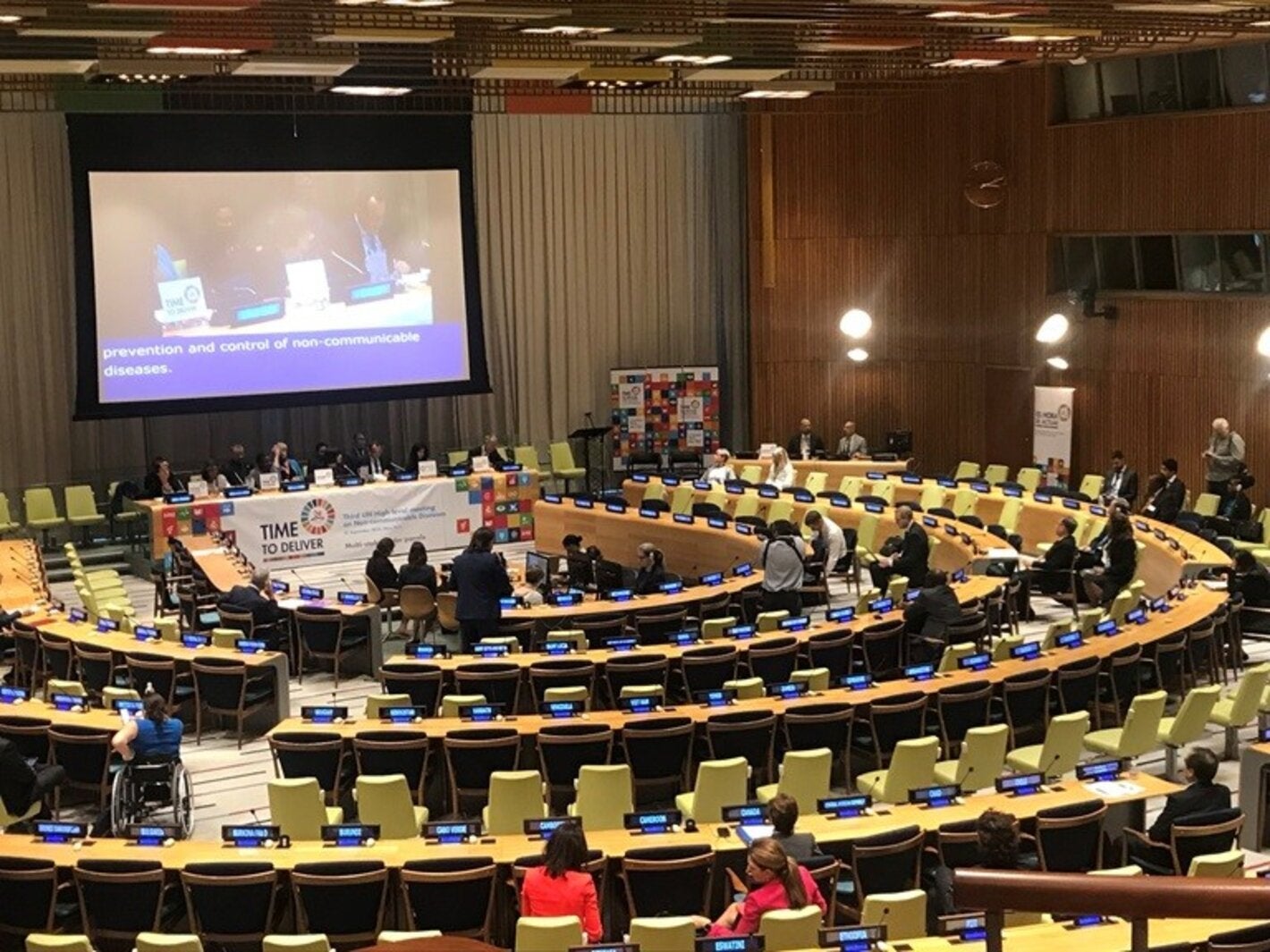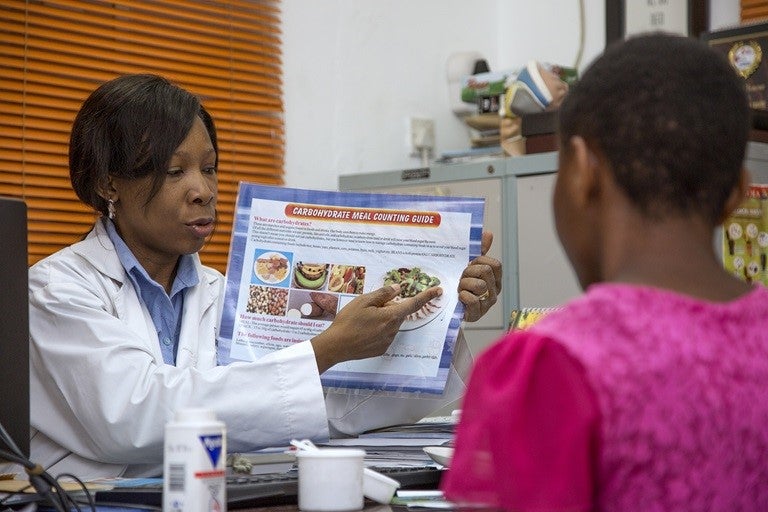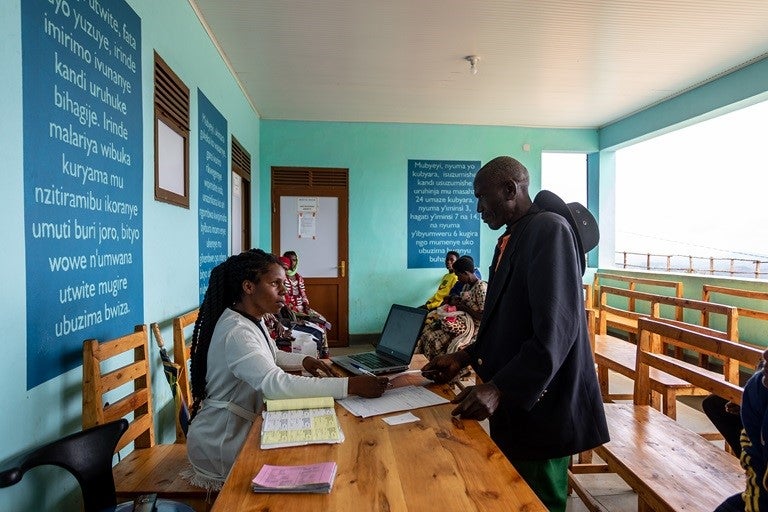Dans la perspective de la quatrième réunion de haut niveau de l’Assemblée générale des Nations Unies (HLM4) qui se tiendra en 2025, au cours de laquelle les Chefs d’État et de gouvernement se réuniront pour définir une vision de la prévention et de la maîtrise des maladies non transmissibles à l’horizon 2030 et 2050, dans le cadre d’une déclaration politique devant être adoptée par l’Assemblée générale des Nations Unies.
En route vers la quatrième réunion de haut niveau de l’Assemblée générale des Nations Unies sur la prévention et la maîtrise des
Mandat
La Déclaration politique de la troisième réunion de haut niveau de l’Assemblée générale sur la prévention et la maîtrise des maladies non transmissibles (résolution A/RES/73/2) autorise le Président de l’Assemblée générale des Nations Unies à convoquer la quatrième réunion de haut niveau sur les MNT en 2025. La portée, les modalités, le format et l’organisation de la réunion de haut niveau sur les MNT, y compris les dates, seront convenus par les États Membres dans une résolution distincte, qui sera négociée à une date plus proche de la réunion.
Quels sont les enjeux?
Toutes les deux secondes, une personne de moins de 70 ans meurt des suites d’une maladie non transmissible.
Toutes les deux secondes, une personne de moins de 70 ans meurt des suites d’une maladie non transmissible - notamment les maladies cardiovasculaires, le cancer, le diabète et les maladies respiratoires chroniques - ou d’un trouble de la santé mentale. La plupart de ces décès auraient pu être évités au moyen de services de soins de santé préventifs, curatifs et palliatifs complets, intégrés, en temps voulu, accessibles et adaptés au contexte, et de mesures stratégiques, législatives et réglementaires.
Quatre-vingt-six pour cent de ces vies perdues prématurément surviennent dans des pays à faible revenu et à revenu intermédiaire où l’environnement social, économique et physique offre nettement moins de protection contre les risques et les conséquences des MNT que dans les pays à revenu élevé. Il s’agit notamment d’une protection insuffisante contre les facteurs de risque tels que le tabagisme, l’usage nocif de l’alcool, de mauvaises habitudes alimentaires, le manque d’activité physique et l’exposition à la pollution atmosphérique.
L’opportunité
Dans la perspective de la quatrième réunion de haut niveau, l’OMS exhorte chaque pays, organisation non gouvernementale (ONG), entité, citoyen et personne vivant avec une MNT à soutenir les efforts locaux et mondiaux visant à atteindre l’ensemble des neuf cibles volontaires définies par l’Assemblée mondiale de la Santé en 2013 pour 2025, mesurées par rapport à un niveau de référence de 2010. Cela permettra aux pays d’atteindre la cible 3.4 des ODD (d’ici à 2030, réduire d’un tiers, par la prévention et le traitement, le taux de mortalité prématurée due à des maladies non transmissibles et promouvoir la santé mentale et le bien-être), mesuré par rapport à un niveau de référence de 2025.
L’OMS encourage également tous les pays à mettre en œuvre les engagements pris par les pays lors des trois réunions de haut niveau sur les MNT en 2011, 2014 et 2018 - et exhorte tous les donateurs à augmenter les contributions financières et techniques indispensables à la prévention et à la lutte contre les MNT par des canaux bilatéraux et multilatéraux, y compris le programme de l’OMS sur les MNT et les fonds d’affectation spéciale pertinents qui ont été créés.
Dans la perspective de la quatrième réunion de haut niveau de l’Assemblée générale des Nations Unies, qui se tiendra en 2025 pour réduire le risque de décès prématuré dû aux maladies non transmissibles et sauver des vies, n’oublions pas que chacun d’entre nous a un rôle à jouer dans ce processus. Aujourd’hui et chaque jour, concrétisons les engagements pris en 2018 pour couvrir progressivement davantage de personnes vivant avec une MNT ou exposées à un risque de MNT au moyen de services de santé et de médicaments, et les protéger contre l’exposition aux principaux facteurs de risque.
WHO preparatory process
The preparatory process will include high-level global and technical meetings, expert committees and consultations cosponsored by WHO and relevant partners, which may serve as technical inputs into the negotiations among Member States on the outcome document.
Please note that any inquiry should be sent to OnTheRoadTo2025@who.int
PAHO is actively involved in the preparatory process for HLM4, coordinating with the global activities led by WHO headquarters. In 2024, virtual meetings were held with national NCD program managers to review progress towards the NCD targets, and in March 2025, a regional NCD meeting will be held with national NCD program managers to continue to discuss how to accelerate progress towards the NCD targets.
PAHO is also calling for ‘Best Practices in NCDs’ to create a collection of successful NCD interventions according to the PAHO Best Practices standards. The selected best practices will be presented on PAHO’s webpage, social media, and at the PAHO side event at the UNHLM.
Regional Meeting on Noncommunicable Disease Prevention and Control
Brasilia, Brazil. March 24 - 26, 2025
Emphasize the critical need to accelerate efforts in preventing and controlling NCDs and promoting mental health and well-being to achieve Sustainable Development Goal target 3.4 by 2030 of 1/3rd reduction in NCD premature mortality.
Advocate for the adoption and implementation of multisectoral policies that address the major risk factors for NCDs, including tobacco use, harmful use of alcohol, unhealthy diets, and physical inactivity, as well as key risk factors for mental health conditions, including poverty, violence, and inequality.
Highlight the importance of accelerating the integration of NCDs and Mental Health into primary health care to ensure equitable access and improvements in NCD diagnosis, treatment, and control, building on any experiences with Hearts for hypertension control.
Stress the necessity of securing sustainable financing for the national NCD and mental health programs to ensure that NCD prevention and mental health promotion policies are in place, NCD and mental health services in primary care are well established and that NCD and mental health surveillance take place on an ongoing basis.
Meet regularly and participate actively in meetings with national health authorities and civil society organizations in your country to provide NCD and mental health data and information on effective interventions and advocate for the implementation of the Better Care for NCD initiative.
Work with national governments to secure political commitment and allocate adequate resources for NCD and mental health policies, services and surveillance.
Utilize and disseminate the information on NCDs and mental health in the PAHO ENLACE database.
Collaborate with other government sectors, including education,agriculture, finance, and civil society organizations including patient groups in your country, to implement comprehensive NCD prevention and control and mental health promotion strategies.
Organize national and multi-sector events with key NCD and mental health stakeholders in the country to disseminate information on progress in NCDs and mental health and generate awareness and a self-sustaining advocacy movement.
The current list of meetings includes:
2021
- WHO SIDS Health Summit
- Ministerial meeting on diabetes
- Foods system summit
- Nutrition-for-growth summit
- Ninth session of the Conference of the Parties to the WHO Framework Convention on Tobacco Control (COP9)
- Second session of the Meeting of the Parties to the Protocol to Eliminate Illicit Trade in Tobacco Products (MOP2)
- United Nations Climate Conference of the Parties (COP26)
- 10th international conference of health promotion
2022
- International Strategic Dialogue on NCDs and the SDGs, 12 April, Accra
- First gathering of Global Group of Heads of State and Government on NCD, September, New York
- WHO Global and Regional Technical Meeting on addressing NCDs in emergencies (13–15 December)
2023
- WHO SIDS High-level technical meeting on NCDs and mental health (17–18 January), Barbados
- WHO Global Ministerial Conference on the Prevention and Control of NCDs in Small Island Developing States (SIDS) (14–16 June), Barbados
- Second High-level Meeting of the United Nations General Assembly on universal health coverage, 21 September 2023
- Second annual gathering of the Global Group of Heads of State and Government for the prevention and control of NCDs during the United Nations General Assembly, 21 September 2023
2024
- 10th session of the Conference of the Parties to the WHO Framework Convention on Tobacco Control (COP10), 5–10 February 2024, Panama
- Third session of the Meeting of the Parties to the Protocol to Eliminate Illicit Trade in Tobacco Products (MOP3), 12–15 February 2024, Panama
- High-level technical meeting on NCDs in emergencies, Copenhagen, 27–29 February
- 1st Multistakeholder forum for second global dialogue on sustainable financing for NCDs and mental health, 15 March
- 1st WHO symposium on meaningful engagement, April
- Web-based consultations, 22 April–20 May
- 2nd Multistakeholder forum for second global dialogue on sustainable financing for NCDs and mental health, 6 May
- WHO second global dialogue on sustainable financing for NCDs and mental health, Washington D.C., 18–20 June
- 2nd WHO symposium on meaningful engagement, September/November
- Second general meeting of the Global Coordination Mechanism on NCDs (GCM), November
- WHO Global Oral Health Meeting, 26–29 November
2025
- Member States will consider the report of the United Nations Secretary-General at the United Nations General Assembly.
- The President of the United Nations General Assembly will appoint 2 co-facilitators who will preside over the negotiations among Permanent Missions in New York of a “modalities resolution” setting out the scope, modalities, format and organization of the Fourth High-level Meeting.
- Dialogue of President of the United Nations General Assembly with civil society and the private sector.
- The co-facilitators will preside over the negotiations among Permanent Missions in New York on the 2025 outcome document
- The Fourth High-level Meeting will convene under the auspices of the President of the United Nations General Assembly (as per the date included in the “modalities resolution”) to adopt the outcome document. The High-level Meeting will also provide an opportunity for Member States to deliver statements, and for Member States, NGOs and private sector entities to engage in roundtable discussions.
2024 Progress Report of the United Nations Secretary-General
The Political Declaration of the Third High-level Meeting of the United Nations General Assembly on the Prevention and Control of Non-communicable diseases (resolution A/RES/73/2) requests the United Nations Secretary-General to submit to the General Assembly, by the end of 2024, for consideration by Member States, a report on the progress achieved in the implementation of the 2011, 2014 and 2018 Political Declarations on NCDs.
Taking into account WHO’s leadership and coordination role in promoting and monitoring global action against NCDs, including in relation to the work of other relevant United Nations agencies, development banks, and other regional and international organizations in addressing NCDs in a coordinated manner, the WHO Director-General will prepare the report, in consultation with Member States, on behalf of the Secretary-General.
The format of the report in 2024 will be similar to the format used in previous reports and will include:
- Chapter 1: Introduction
- Chapter 2: Progress towards internationally agreed targets: Where do we stand? (Advances and challenges)
- Chapter 3: Progress made in fulfilling the assignments given to WHO
- Chapter 4: Progress made in fulfilling the commitments made by Member States
- Chapter 5: Progress made in strengthening international cooperation
- Chapter 6: Recommendations for consideration by Member States during the negotiations on the 2025 political declaration on NCDs
- Annex: Individual country data on the 10 progress indicators set out in the technical note published by WHO on 1 May 2017.
The road to 2025 builds on key World Health Assembly resolutions, decisions and commitments made by Member States to advance the NCD agenda, including:
- Resolution WHA53.17 (2000) on prevention and control of noncommunicable diseases.
- Resolution WHA57.17 (2004) on global strategy on diet, physical activity and health.
- Resolution WHA63.13 (2010) on global strategy to reduce the harmful use of alcohol.
- Resolution WHA65.6 (2012) on comprehensive implementation plan on maternal, infant and young child nutrition.
- Resolution WHA66.8 (2013) on comprehensive mental health action plan 2013–2020.
- Resolution WHA66.10 (2013) which endorsed the NCD-GAP and adopted the global monitoring framework (GMF) comprising 9 global targets and 25 indicators, with EB130.R7 outlining the process for implementation of the GMF. Further review and refreshing of the GMF was later recommended to ensure greater alignment with major developments in the field of international health and development since 2013 including the SDGs and their targets and indicators.
- Resolution WHA68.19 (2015) on outcome of the Second International Conference on Nutrition.
- Resolution WHA70.12 (2017) on cancer prevention and control in the context of an integrated approach.
- Decision WHA70(17) (2017) on global action plan on the public health response to dementia.
- Decision WHA70(19) (2017) on report of the Commission on Ending Childhood Obesity: implementation plan.
- Resolution WHA71.6 (2018) on WHO global action plan on physical activity 2018–2030.
- Resolution WHA71.9 (2018) on infant and young child feeding.
- Resolution WHA72.11 (2019) to extend the period of the NCD-GAP to 2030 to ensure alignment with the 2030 Agenda for Sustainable Development, to consolidate annual reports to be submitted to the Health Assembly through the Executive Board, from 2021 to 2031, annexing reports on implementation of relevant resolutions, action plans and strategies.
- A mid-point evaluation of the progress achieved in the implementation of the NCD GAP was conducted in 2020.
- Resolution WHA74.4 (2021) on reducing the burden of NCDs through strengthening prevention and control of diabetes.
- Implementation roadmap 2023–2030 for the global action plan for the prevention and control of NCDs 2013–2030 (NCD-GAP), as requested by WHA74.10, was submitted to the 75th World Health Assembly (A75/10 Add.8) (2022)
- Resolution A75/10 Add.2, Annex 4 (2022) with recommendations on how to strengthen the design and implementation of policies, including those for resilient health systems and health services and infrastructure, to treat people living with NCDs and to prevent and control their risk factors in humanitarian emergencies.
- Decision WHA75(11) (2022) adopted recommendations for the prevention and management of obesity over the life course and related targets, which were accompanied by an acceleration plan that clarifies how WHO will support Member States in implementing these recommendations.
- Update of Appendix 3, formulated in response to decisions WHA72.11 (2019) and WHA75.11 (2022), to complement existing global strategies and action plans and several new technical products that support the implementation road map 2023‒2030 for the GAP-NCD, including the WHO menu of cost-effective interventions for mental health, the recommended interventions to address the health impact of air pollution, and the menu of cost-effective interventions for oral health.
- Resolution WHA76 (9) (2023) endorsed the draft updated menu of policy options and cost-effective interventions for the prevention and control of NCDs (2022 update of Appendix 3 of the WHO GAP-NCDs 2013–2030) and requested the revision of interventions in Appendix 3 on a continuous basis, when data are available.
- 2023 Bridgetown Declaration on NCDs and mental health launched during the Small Island Developing States (SIDS) Ministerial Conference on NCDs and mental health held on 14–16 June 2023.
Previous reports of the United Nations Secretary-General on the progress made in the prevention and control of NCDs
- (2017) Fourth report https://undocs.org/en/A/72/662
- (2013) Third report https://undocs.org/A/68/650
- (2011) Second report https://undocs.org/en/A/66/83
- (2010) First report https://undocs.org/en/A/65/362
WHO Progress Monitor on NCDs
- 2020 – https://www.who.int/publications/i/item/ncd-progress-monitor-2020
- 2017 – https://www.who.int/publications/i/item/9789241513029
- 2015 – https://www.who.int/publications/i/item/noncommunicable-diseases-progress-monitor-2015
Reports of the WHO Director-General on the progress made in the prevention and control of NCDs
- 2022 – https://apps.who.int/gb/ebwha/pdf_files/EB152/B152_6-en.pdf
- 2021 – https://apps.who.int/gb/ebwha/pdf_files/EB148/B148_7-en.pdf
- 2020 – https://apps.who.int/gb/ebwha/pdf_files/EB146/B146_7-en.pdf
- 2019 – https://apps.who.int/gb/ebwha/pdf_files/WHA72/A72_19-en.pdf
- 2018 – https://apps.who.int/gb/ebwha/pdf_files/WHA71/A71_14-en.pdf
- 2017 – https://apps.who.int/gb/ebwha/pdf_files/WHA70/A70_27-en.pdf
- 2016 – https://apps.who.int/gb/ebwha/pdf_files/WHA69/A69_10-en.pdf
- 2015 – https://apps.who.int/gb/ebwha/pdf_files/WHA68/A68_11-en.pdf
- 2014 – https://apps.who.int/gb/ebha/pdf_files/WHA67/A67_14-en.pdf
- 2013 – https://www.who.int/publications/i/item/9789241506236
- 2012 – https://apps.who.int/gb/ebwha/pdf_files/WHA65/A65_6-en.pdf
- 2011 – https://apps.who.int/gb/ebwha/pdf_files/WHA64/A64_21-en.pdf





